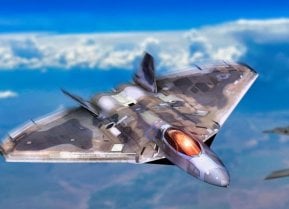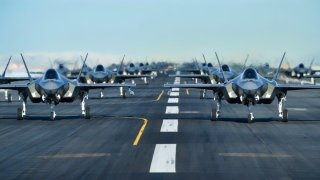The F-35 Fighter's Biggest Enemy: Itself
The United States Department of Defense (DoD) has refused to accept newly built F-35s due to problems with the software, and the resolution has slipped several times from the expected April 2023 release date. TR-3 is now projected to be completed sometime this summer – but not earlier than July, and possibly as late as September.
The F-35 TR-3 Delays Could Put the Program on Hold: The Lockheed Martin F-35 Lightning II has been described as an unstoppable fighter – but that might not be so true. The aircraft remains unbeaten in aerial combat, yet software bugs could ground the aircraft.
Breaking Defense first reported on Thursday that problems with an upgrade installed on some of the fifth-generation stealth fighters have disrupted plans to incorporate the update on existing aircraft, and the F-35 Joint Program Office (JPO) doesn't know when the current fleet could receive the much-anticipated retrofits.
The program was scheduled to begin the Technology Refresh 3 (TR-3) retrofits beginning this month, and the plans called for 149 aircraft to be updated over the next year.
"The Program is working closely with F-35 customers to establish a new start date for those modifications based on a number of factors including software and supply chains," JPO spokesperson Russ Goemaere told Breaking Defense, adding, "Very capable TR-2 jets will continue to fly operational missions while awaiting the start of TR-3 retrofits… we must improve our efficiency in integrating and testing TR-3 and Block 4 capabilities."
New F-35 Aircraft Are Impacted
The United States Department of Defense (DoD) has refused to accept newly built F-35s due to problems with the software, and the resolution has slipped several times from the expected April 2023 release date. TR-3 is now projected to be completed sometime this summer – but not earlier than July, and possibly as late as September.
The JPO is reportedly exploring a plan that could see deliveries of the fifth-generation fighter delivered before the TR-3 update is completed. Lockheed Martin has also continued to build and deliver jets equipped with TR-2 and announced plans on shipping out TR-3 kits that could be swapped out with the TR-2 on existing aircraft. The Pentagon has even considered accepting TR-2 aircraft currently in storage and waiting for the updates to follow.
However, when those retrofits could be delivered is also an unknown.
"Retrofits will be deferred for a period of time until TR-3 software performance improves and manufacturing rates of TR-3 hardware meets the demands of production, sustainment, and retrofits," added Goemaere. "The F-35 program has been and continues to take steps to increase manufacturing rates with progress over recent months."
These delays could slow the roll for the F-35, even as Lockheed Martin has maintained it can still build at a rate of 156 jets per year. As few as 75 to 110 new stealth fighters are expected to be delivered in 2024 as a result of the TR-3 issues.
F-35 TR-3: More Than a Software Patch
The significance of TR-3 can't be overstated and it is far more than merely patching software on a computer. It is akin to a full version upgrade and more.
This upgrade is crucial for enhancing the jet's digital infrastructure and weapon systems. As reported by Stavros Atlamazoglou for The National Interest, TR-3 "will upgrade the F-35’s onboard digital infrastructure, improving its data storage and processing capabilities; and improve the user interface, thus making the pilot’s life easier. The new software will also enable the stealth fighter jet to carry new air-to-air and air-to-ground weapons, sensors, and cyber countermeasures."
Atlamazoglou added, "Complicating matters even further is the fact that the upcoming Block 4 upgrade needs the TR-3 as a software upgrade as a base."
According to the JPO, TR-3 provides "the computational horsepower to support modernized Block 4 capabilities for the F-35 including: new sensor suites, more long-range precision weapons, improved electronic warfare features, more powerful data fusion, and increased cross-platform interoperability. These capabilities provide the warfighter a combat-edge to identify, track, engage, and survive against advanced air, ground, and cyber threats. TR-3 significantly updates core processing power and memory capacity, which will allow the F-35 to run advanced software packed with state-of-the-art warfighting capabilities."
The first F-35 equipped with an early version of the TR-3 conducted a test flight in January 2023.
Author Experience and Expertise: Peter Suciu
Peter Suciu is a Michigan-based writer. He has contributed to more than four dozen magazines, newspapers, and websites with over 3,200 published pieces over a twenty-year career in journalism. He regularly writes about military hardware, firearms history, cybersecurity, politics, and international affairs. Peter is also a Contributing Writer for Forbes and Clearance Jobs. You can follow him on Twitter: @PeterSuciu.
You can email the author: [email protected].


